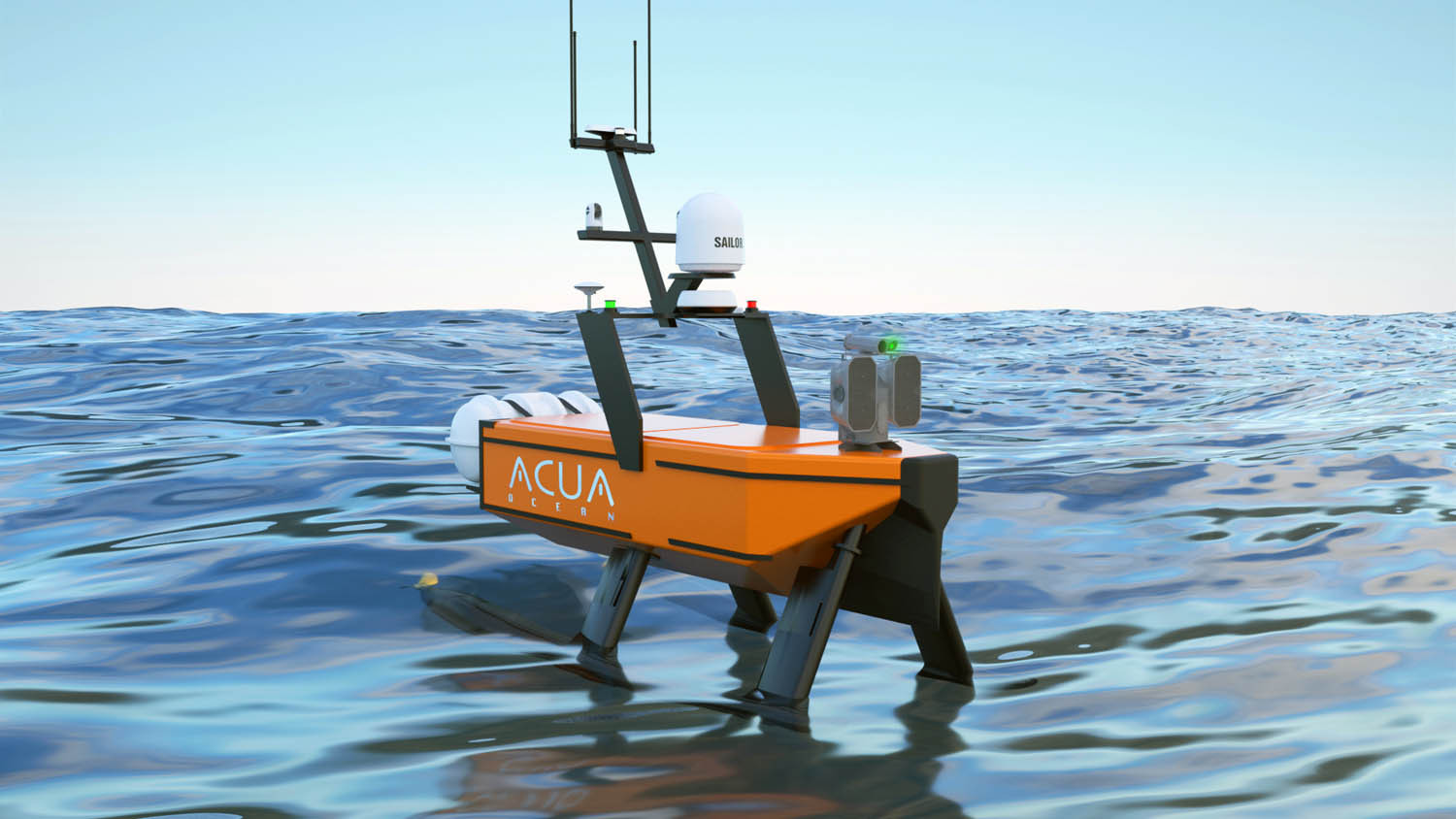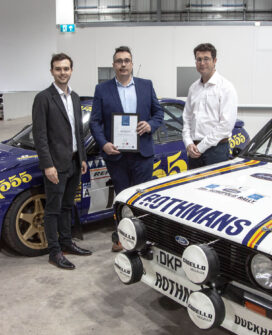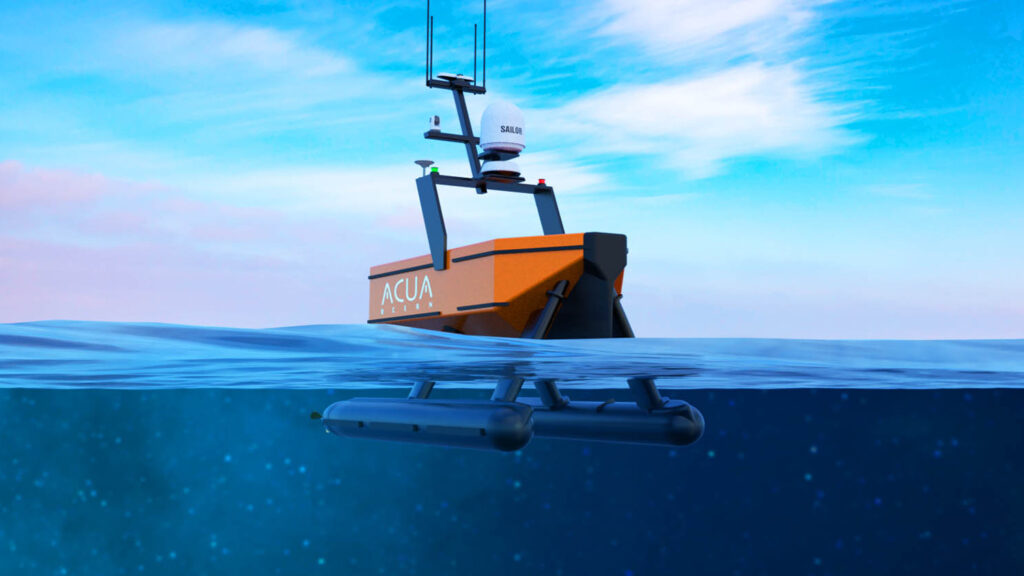Acua Ocean, this year’s winner of The RAPID Challenge, has created a hydrogen-powered vessel for the long-range patrol of our oceans. Stephen Holmes finds out how developing a digital twin helped de-risk the process, aiding development and attracting investors
For more risk-averse investors, a marine craft start-up that combines new fuel systems technology, robotics and artificial intelligence (AI) could quite easily be seen as a step too far outside of their comfort zone. However, the team at Acua Ocean has carefully plotted a course through potentially choppy waters.
The company’s design for its hydrogen-powered uncrewed surface vessel (H-USV), the Ocean Protector, focuses on the need of companies that own or operate marine-based infrastructure, such as offshore energy installations, for a physical presence out on the open seas, acting as a form of security deterrent and providing a manoeuvrable monitoring capability.
Adding various sensors onboard the vessel allows it to collect a whole range of data for external stakeholders, from border control and fisheries protection agents, to researchers studying the oceans and the life within them. While battery-powered craft and aerial drones can provide near-shore resources, Acua Ocean’s focus is on more remote ocean stretches, where a 10-day battery life would be exhausted far too quickly.
The hydrogen system, repurposed from one used in a heavy-duty land vehicle, but with fewer moving parts than the diesel equivalent, means the Ocean Protector can manage over 70 days out at sea, is capable of reaching 20 knots, with the endurance to last the distance and power multiple sensors, while reducing CO2 emissions by up to 99.3%.

Fishing for support
Early on, the Acua Ocean team realised that proving the design of the Ocean Protector would be critical to attracting potential investors. “To analyse and de-risk the vessel from a technical analysis perspective, we spent nearly a year working on the digital twin,” says Acua Ocean chief operating officer Michael Tinmouth.
“Working with One PLM, Siemens and Ansys, the three software providers that have been supporting us, essentially enabled us to go out to Innovate UK, to go out to investors and say, ‘Look, we’ve shown in a synthetic environment through reporting and analysis that this vessel has got, from a design perspective, a credible chance of success.’”
A key factor for enabling this analysis has been the backing of these software vendors through their hardware start-ups programmes. Siemens, Ansys and One PLM all have start-up programmes to make their technology accessible, explains Tinmouth, “not just from a price point or licensing perspective, but actually the support has been phenomenal. They’ve genuinely invested time and energy into us, which has been fantastic.”
The qualified digital twin will also prove key to meeting regulations, in the build, prototyping and low-volume manufacturing phases.
Already, Acua Ocean has worked with classification society Lloyd’s Register, with the digital twin proving “critical to that process”, says Tinmouth, making Ocean Protector “far more dynamic, more agile, more fluid.”
A project of this nature requires working with many subcontractors, he points out, rewinding the story back to March 2021, when the analysis around the digital twin helped the team secure grant funding from the UK Department for Transport and Innovate UK through the Clean Maritime Demonstration Competition in partnership with Southampton University’s Marine and Maritime Institute.
This funding enabled the team to further its CFD and seakeeping analysis, as well as running model simulations in a tow tank and performing the necessary work with regulators.
“We realised we could be experts in terms of the concept in the design of USV, but we wanted to work with real specialists in terms of the detail, and so we’ve got this brilliant British supply chain that’s come together to build out a lot of the technology that we’ve developed,” says Tinmouth.
This has led to the prototyping stage, using the digital twin to aid collaboration and incorporate feedback from experienced subcontractors up and down the country, from shipbuilders at PDL Marine in Porchester to specialist advisors on hydrogen systems and electrical systems at eTech49 in Newcastle.
Acua Ocean – Winning entry

In November 2021 came the news that the Acua Ocean team had achieved overall victory in The RAPID Challenge, a competition for hardware start-ups from all fields.
Organised by Prodrive Ventures, the prize includes cash and a range of services, guidance and mentorship from competition partners. These include such names as design and manufacturing experts RPD International, R&D funding consultants TBAT Innovation, HSBC, Crowdcube, go-to-market agency Bridgehead International, software reseller OnePLM, legal experts The IP Asset Partnership, as well as Prodrive’s own mechanical design and engineering experts.
Tinmouth is delighted with the win, and full of praise for the other competitors, but given the unconventional and unique product that his team is working to realise, it’s clear that the prize elements of professional collaboration and assistance are what excites him most.
“How do you ramp up production, particularly in our space where we’re not looking at mass-producing 100,000 units? We’re looking at how we go from a prototype to low-volume manufacturing, that could be initially 10 units a year, maybe at scale 500 units a year, but with deep technology and very innovative manufacturing solutions,” he says.
“So the likes of Prodrive and RPD are absolutely critical on that side, and then the services offering side is just phenomenal. To be working with organisations that understand the importance of grant funding, R&D, research, funding, IP, and patent protection, which is all part of the de-risking for investors.”
His advice to other ambitious hardware entrepreneurs? “If you’re able to go through and secure Innovate UK funding, and then a very robust patent process, that really de-risks the process. The RAPID Challenge is just perfectly positioned to be able to shine a light upon UK hard tech start-ups.”
With the prototype of the Ocean Protector scheduled to launch in May 2022, hopefully further smooth sailing lies ahead.






